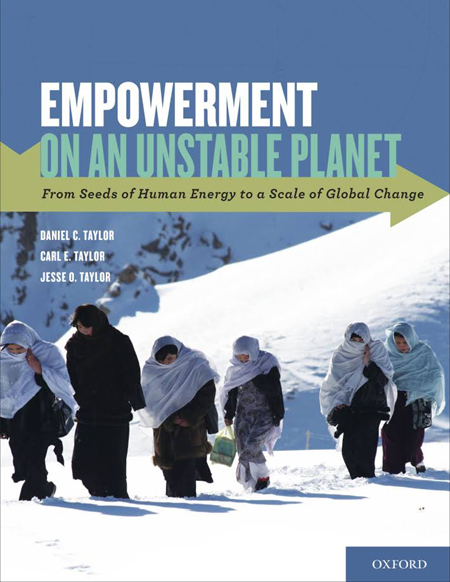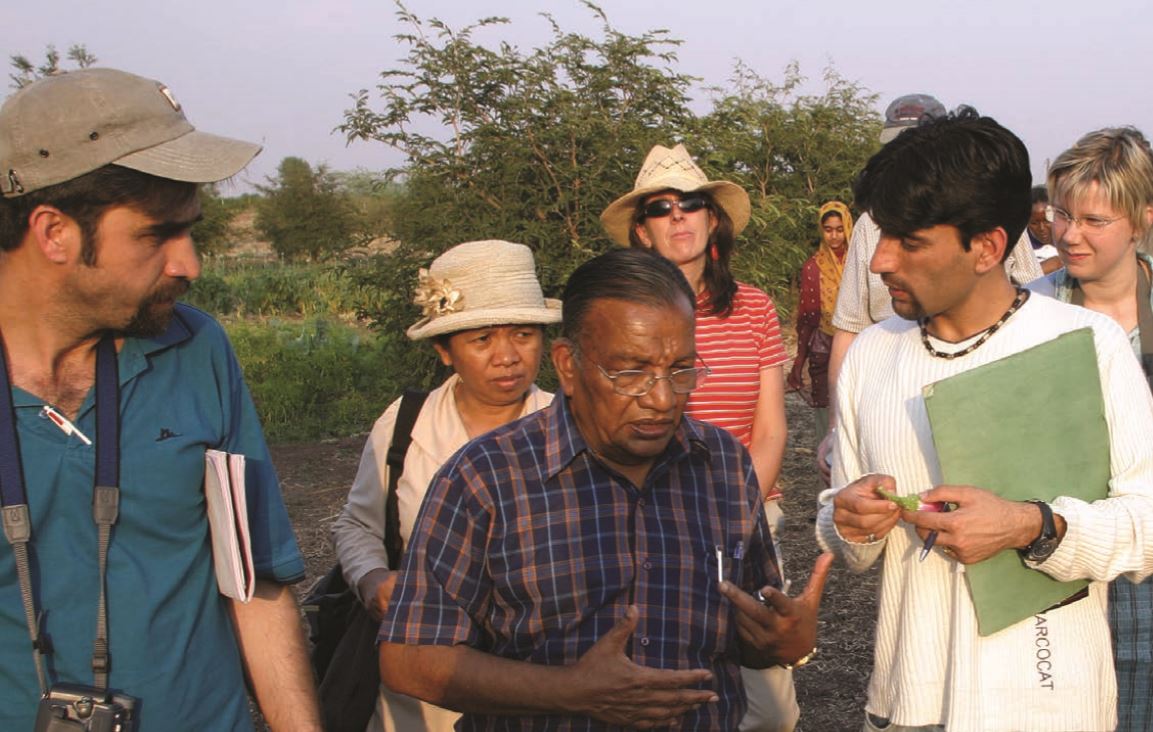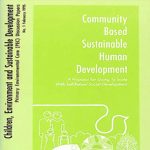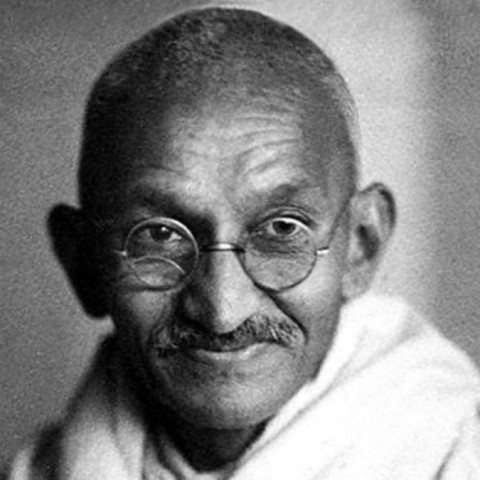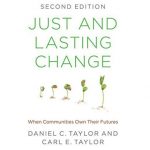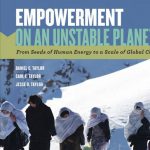Empowerment on an Unstable Planet
Empowerment on an Unstable Planet: From Seeds of Human Energy to a Scale of Global Change. This book is about solutions for all: all people, across the entire planet. When all are not advancing, humanity is dividing. Recent global economic failures have not only increased the proportion of the disadvantaged, but also made clear the tenuousness of current prosperity. Such vulnerability is echoed in the reality of major climate change and the probability of pandemics. Denial is an option, as is living in hope of technological remedies, or attempting to change regulatory systems. But such responses duck the fact that until solutions start reaching all they limit the likelihood of truly solving the underlying conditions. We need a process that changes the fundamentals of our response capacity, and we need to start using this process now.
The good news is that in pursuing opportunity for all those of us who have achieved the good life do not need to give it up. Instead, we can continue to improve—but to do so we need to more systematically use our most plentiful base of change: our human energy. We increasingly try to do everything with money, which is a scarce commodity. Indeed, its efficacy is predicated upon its scarcity. However, as this book will argue, a currency is available that is underutilized and universally present: the energies of people. Simply put, deep, fundamental change in our lives happens because of what people do, people making use of what they have, where they are, today.
Once its potential is understood community-based growth can grow very quickly as people teach each other, as people hold each other accountable, and people daily act in adaptive decisions to respond to opportunities. Such growth, unlike many other approaches, does not begin with policy reforms by national governments, nor does it depend on the commonly assumed infusions of financial support, nor does it depend on technological innovations.6
There is an urgency to put in place such solutions. Riots and terror cells anywhere call forth our armies because those riots can spread and terror’s networks are as far-reaching as they are invisible. Epidemics today remind us that our children’s health is vulnerable to viruses in a pig in Mexico or in a chicken in China tomorrow. World finances sit exposed to computer hackers anywhere from across the ocean to down the block.
Global climate change, more serious and more certain every year, is producing natural systems that are less reliable and ever more prone to destructive extremes. Clearly, the traditional solutions—technological fixes, gated enclaves of privilege, vaccines, armies, and regulatory systems—are inadequate. Terrorism can appear anywhere, mutations can occur at any time among any population, and armies increasingly cause civilian casualties that transform military victories into quagmires in which soldiers come to fight not an enemy but a population. In the modern world, isolation behind gates, borders, or conference rooms is both ineffective and ethically bankrupt. All life rides into the future together on a planet increasingly defined by instability.
A dual-pronged challenge lies before us. Undeniably there has been progress—five out of seven humans have a better shot at life than did their grandparents. But the systems improving the conditions of human existence are working at only two-thirds capacity, as the numbers excluded grow and the gulf separating the prosperous from the destitute yawns ever wider. Furthermore, the vast experiment of industrial modernity that humanity has pursued since the late eighteenth century has wreaked havoc upon the ecosystems on which it depends, and now threatens to choke the planet itself with steadily rising effluence. The processes for advancement in the twenty-first century need to evolve in such a way that they no longer contain within them inherent processes of planetary destruction and human destitution.
Many development projects speak of “empowering the people” and “growing capacity in communities,” yet this well-intentioned language too often remains only that. Genuine human progress involves the use of human hands, hearts, and minds to do what we can with what we have, here, today. Every human being, even the most impoverished, has a portion of discretionary energy to direct. Begin with that, grow it. Impoverished Indian villagers could place one foot in front of the other to follow the Mahatma on the salt march to the sea; they could guide thread over a wooden spindle; they could refuse to eat. Such simple actions grew to overpower an empire, and once-marginalized people gained the freedom of aspirations for the future. The real meaning of freedom that Gandhi was pursuing has been lost in the histrionics of democracy.
Using their own energies, people can overthrow their burdens and attain such multifaceted freedoms without consuming or selling off their scarcest resources. Working in partnership with their governments and the experts they can access, they can start to build on what they already have. Then, much as economic growth compounds profits, communities compound this resource so that benefits accrue to all. Economists term this “a process of increasing returns.” In the process advocated here, the returns come in the form of compounding human energy rather than money. Examples in this book demonstrate increasing returns growing in very challenging places: among them saving thousands of children from dying in India, protecting six million acres around Mount Everest in China and also promoting peace in Afghanistan.
This alternative thesis to today’s dominant paradigm runs counter to the dominant understanding in which the foundation of societal advancement is seen to be economic growth—that profits from economic growth provide the basis for improving health, education, physical security, even the environment. There is no doubt that economic growth can generate surpluses that then allow society to invest in itself. However, this truth is not universal; economic growth does not benefit all people. It lifts some, at times lifts even most, but by its very nature it thrives on disparity; it benefits some more than others. Those who already have get more, while those with nothing to invest are left behind. To make money you need money, natural resources, or other people’s labor to exploit. This mode of advancement works for those who possess one of these resources—and it works best for those with all three. But it does not work for all.
The emphasis on economic growth has had a destructive dynamic for communities. As economist Stephen Marglin insightfully states, “Undermining community is the logical and practical consequence of promoting the market system.” The market system is based on the expectation that individuals will act in rationally calculating self-interest, but the consequence is competition that pulls communities apart. Communities are the organizational structure humans have worked within over millennia to channel and apply their energy. What is needed is a process of community-strengthening through which individuals are supported.
Community, as we use the term, is any group that has something in common and the potential for acting together. It is a three-way partnership of people with their governments and with those outside who have an interest in people’s well-being. It is large enough to resist exploitation and small enough that each individual has a voice in shaping life’s impact on him- or herself. This way of using the term community allows its extension across geographical locations, as occurs with professional or ethnic communities, and, increasingly, through the Internet. We go to war and die for community; when we die for ourselves there is no future. A sense of community turns members from behaving in only individual interest to putting in place networks of relationships that support all.
Above Paragraphs From
Empowerment on Unstable Planet (Introduction)
Authors: Daniel C Taylor, Carl E Taylor & Jesse O Taylor
Oxford University Press 2012

